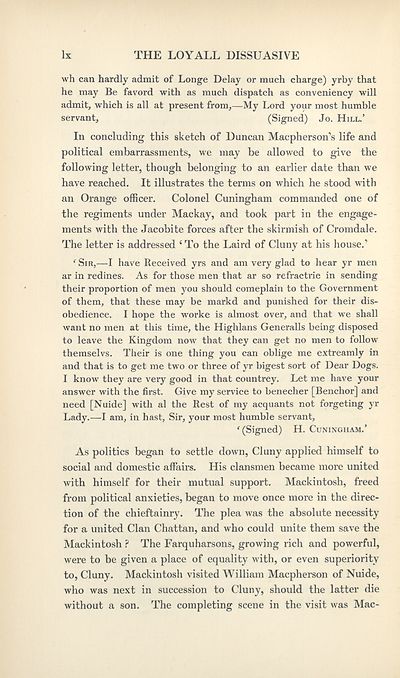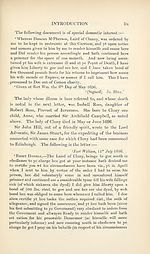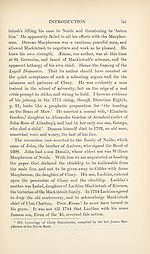Series 1 > Loyall dissuasive
(75) Page lx
Download files
Complete book:
Individual page:
Thumbnail gallery: Grid view | List view

lx
THE LOYALL DISSUASIVE
wh can hardly admit of Longe Delay or much charge) yrby that
he may Be favord with as much dispatch as conveniency will
admit, which is all at present from,—My Lord your most humble
servant, (Signed) Jo. Hill.’
In concluding this sketch of Duncan Macpherson’s life and
political embarrassments, we may be allowed to give the
following letter, though belonging to an earlier date than we
have reached. It illustrates the terms on which he stood with
an Orange officer. Colonel Cuningham commanded one of
the regiments under Mackay, and took part in the engage¬
ments with the Jacobite forces after the skirmish of Cromdale.
The letter is addressed ‘ To the Laird of Cluny at his house.’
‘ Sir,—I have Received yrs and am very glad to hear yr men
ar in redines. As for those men that ar so refractrie in sending
their proportion of men you should comeplain to the Government
of them, that these may be markd and punished for their dis¬
obedience. I hope the worke is almost over, and that we shall
want no men at this time, the Highlans Generalls being disposed
to leave the Kingdom now that they can get no men to follow
themselvs. Their is one thing you can oblige me extreamly in
and that is to get me two or three of yr bigest sort of Dear Dogs.
I know they are veiy good in that countrey. Let me have your
answer with the first. Give my service to benecher [Benchor] and
need [Nuide] with al the Rest of my acquants not forgeting yr
Lady.—I am, in hast, Sir, your most humble servant,
'(Signed) H. Cuningham.’
As politics began to settle down, Cluny applied himself to
social and domestic affairs. His clansmen became more united
with himself for their mutual support. Mackintosh, freed
from political anxieties, began to move once more in the direc¬
tion of the chieftainry. The plea was the absolute necessity
for a united Clan Chattan, and who could unite them save the
Mackintosh ? The Farquharsons, growing rich and powerful,
were to be given a place of equality with, or even superiority
to, Cluny. Mackintosh visited William Macpherson of Nuide,
who was next in succession to Cluny, should the latter die
without a son. The completing scene in the visit was Mac-
THE LOYALL DISSUASIVE
wh can hardly admit of Longe Delay or much charge) yrby that
he may Be favord with as much dispatch as conveniency will
admit, which is all at present from,—My Lord your most humble
servant, (Signed) Jo. Hill.’
In concluding this sketch of Duncan Macpherson’s life and
political embarrassments, we may be allowed to give the
following letter, though belonging to an earlier date than we
have reached. It illustrates the terms on which he stood with
an Orange officer. Colonel Cuningham commanded one of
the regiments under Mackay, and took part in the engage¬
ments with the Jacobite forces after the skirmish of Cromdale.
The letter is addressed ‘ To the Laird of Cluny at his house.’
‘ Sir,—I have Received yrs and am very glad to hear yr men
ar in redines. As for those men that ar so refractrie in sending
their proportion of men you should comeplain to the Government
of them, that these may be markd and punished for their dis¬
obedience. I hope the worke is almost over, and that we shall
want no men at this time, the Highlans Generalls being disposed
to leave the Kingdom now that they can get no men to follow
themselvs. Their is one thing you can oblige me extreamly in
and that is to get me two or three of yr bigest sort of Dear Dogs.
I know they are veiy good in that countrey. Let me have your
answer with the first. Give my service to benecher [Benchor] and
need [Nuide] with al the Rest of my acquants not forgeting yr
Lady.—I am, in hast, Sir, your most humble servant,
'(Signed) H. Cuningham.’
As politics began to settle down, Cluny applied himself to
social and domestic affairs. His clansmen became more united
with himself for their mutual support. Mackintosh, freed
from political anxieties, began to move once more in the direc¬
tion of the chieftainry. The plea was the absolute necessity
for a united Clan Chattan, and who could unite them save the
Mackintosh ? The Farquharsons, growing rich and powerful,
were to be given a place of equality with, or even superiority
to, Cluny. Mackintosh visited William Macpherson of Nuide,
who was next in succession to Cluny, should the latter die
without a son. The completing scene in the visit was Mac-
Set display mode to:
![]() Universal Viewer |
Universal Viewer | ![]() Mirador |
Large image | Transcription
Mirador |
Large image | Transcription
Images and transcriptions on this page, including medium image downloads, may be used under the Creative Commons Attribution 4.0 International Licence unless otherwise stated. ![]()
| Scottish History Society volumes > Series 1 > Loyall dissuasive > (75) Page lx |
|---|
| Permanent URL | https://digital.nls.uk/127547905 |
|---|
| Attribution and copyright: |
|
|---|
| Description | Over 180 volumes, published by the Scottish History Society, containing original sources on Scotland's history and people. With a wide range of subjects, the books collectively cover all periods from the 12th to 20th centuries, and reflect changing trends in Scottish history. Sources are accompanied by scholarly interpretation, references and bibliographies. Volumes are usually published annually, and more digitised volumes will be added as they become available. |
|---|


